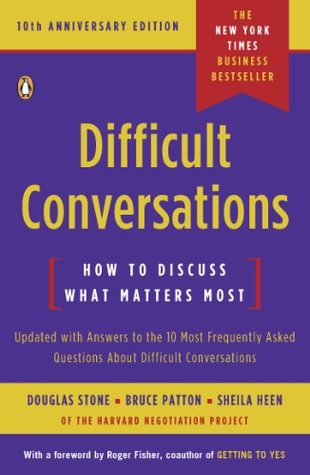More on this book
Community
Kindle Notes & Highlights
Read between
May 20 - July 27, 2020
The point is this: difficult conversations are almost never about getting the facts right. They are about conflicting perceptions, interpretations, and values.
They are not about what is true, they are about what is important.
What I think about your intentions will affect how I think about you and, ultimately, how our conversation goes.
But talking about fault is similar to talking about truth — it produces disagreement, denial, and little learning. It evokes fears of punishment and insists on an either/or answer. Nobody wants to be blamed, especially unfairly, so our energy goes into defending ourselves.
difficult conversations do not just involve feelings, they are at their very core about feelings.
If you’re no longer the hero, will people see you as the villain?
Telling someone to change makes it less rather than more likely that they will. This is because people almost never change without first feeling understood.
There’s only one way to come to understand the other person’s story, and that’s by being curious. Instead of asking yourself, “How can they think that?!” ask yourself, “I wonder what information they have that I don’t?” Instead of asking, “How can they be so irrational?” ask, “How might they see the world such that their view makes sense?” Certainty locks us out of their story; curiosity lets us in.
Once we think we have someone figured out, we see all of their actions through that lens, and the stakes rise.
When we think others have bad intentions toward us, it affects our behavior. And, in turn, how we behave affects how they treat us. Before we know it, our assumption that they have bad intentions toward us has come true.
People are just different. If we hope to stay together over the long haul, we will sometimes have to compromise our preferences and meet in the middle.
We don’t cry or lose our temper because we express our feelings too often, but because we express them too rarely. Like finally opening a carbonated drink that has been shaken, the results can be messy.
Why is it that they express their feelings and preferences, but you cope with yours privately?
There are several reasons why you may choose to honor others’ feelings even when it means dishonoring your own. The implicit rule you are following is that you should put other people’s happiness before your own.
Friends, neighbors, and bosses will recognize this and begin to see you as someone they can manipulate. When you are more concerned about others’ feelings than your own, you teach others to ignore your feelings too.
Our anxiety results not just from having to face the other person, but from having to face ourselves. The conversation has the potential to disrupt our sense of who we are in the world, or to highlight what we hope we are but fear we are not.
When you hold yourself to an all-or-nothing standard, even a small mistake can seem catastrophic and almost impossible to admit. If you are busy trying to shore up your “no mistakes, no failures” identity, you won’t be able to engage in a meaningful learning conversation. And if you can’t do that, you are likely to make the same mistakes again.
A good rule to follow is: If you’re going to talk, talk. Really talk. And if you’re really going to talk, you can’t do it on the fly. You have to plan a time to talk. You have to be explicit about wanting ten minutes or an hour to discuss something that is important to you. You can’t have a real conversation in thirty seconds, and anything less than a real conversation isn’t going to help.
• Can you say a little more about how you see things? • What information might you have that I don’t? • How do you see it differently? • What impact have my actions had on you? • Can you say a little more about why you think this is my fault? • Were you reacting to something I did? • How are you feeling about all of this? • Say more about why this is important to you. • What would it mean to you if that happened?
Being disappointed that someone isn’t reading our mind is one of our contributions to the problem.
Speak fully the range of your experience and you will be clear. Speak for yourself and you can speak with power.
For many people, realizing that they don’t have to agree brings a sense of great liberation, relief, and empowerment.


